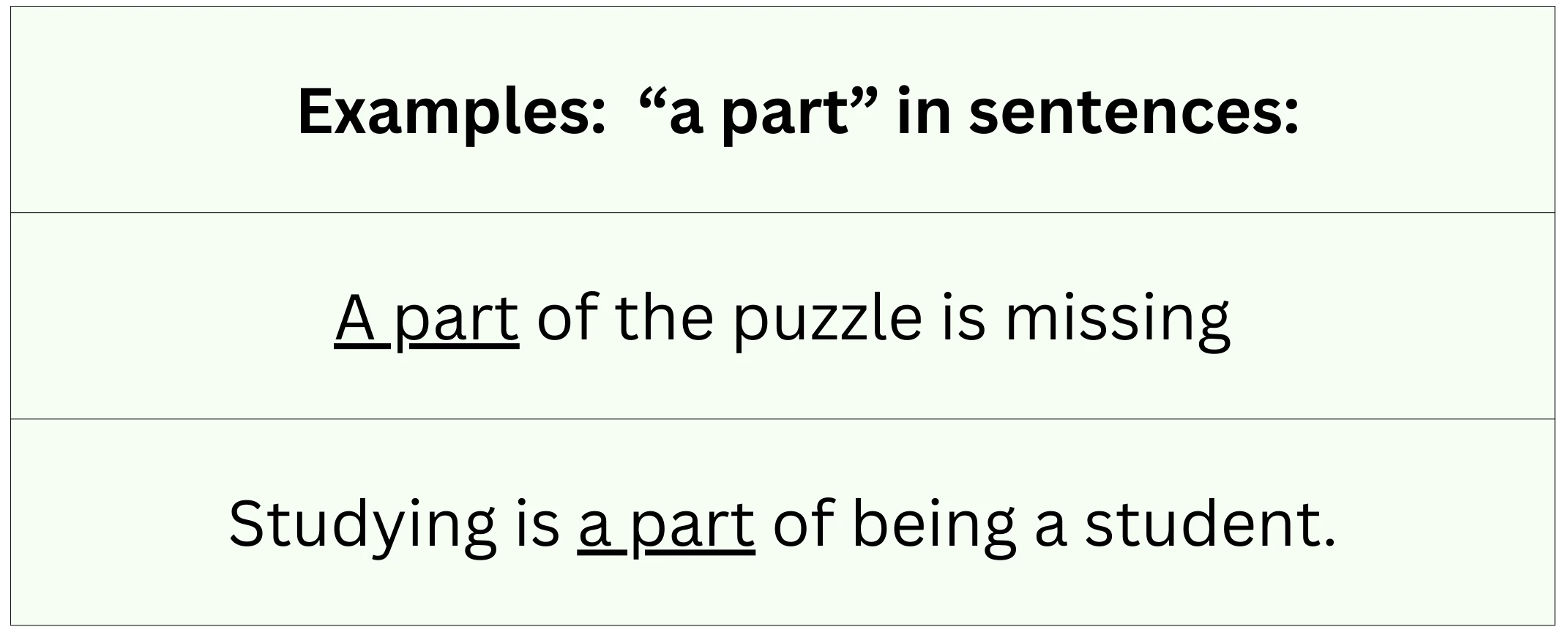How to Use “Apart” and “A Part”
The old couple grew apart after years of disagreement.
He felt like a part of something bigger when he joined the club.
Please don’t take the toys a part; they are fragile.
She’s always wanted to be apart of a dance troupe.
If the difference between apart and a part has got you stumped, then allow this article to clarify the difference and demonstrate the correct use of each.
While they sound the same, “a part” is distinctly two words that combine the article “a” with the noun “part”. Apart is an adverb, and does not share the same meaning as its two-word counterpart (i.e., a part).
‘Apart’ vs. ‘a part’ explained (with examples)
| Examples with “apart” | Examples with “a part” |
| Their birthdays are only three days apart. | I’ve finally been assigned a part in a play. |
As an adverb, apart can indicate separation, distance, or the state of being isolated or distinct from something else.
E.g., “They live far apart from each other” (indicating a physical distance between two locations). Or, “They grew emotionally apart over time” (indicating emotional separation).

A part consists of the article “a” and the noun “part.” It refers to a piece or component of something larger, or a role or segment within a whole.
For example, “She is just a part of the larger team” (referring to a member or one person on a team of players/people). Or, “The engine is a crucial part of the car.” (referring to a component or one piece of a car)
In summary, “apart” describes separation or distance, while “a part” indicates a component or segment within a larger whole. The presence or absence of a space between “a” and “part” is critical to conveying these two separate meanings.
When to use ‘part’ vs. ‘a part’
When is it correct to include ‘a’ before ‘part’? For the most part (no pun intended), the sentence will likely still be clear whether you include an ‘a’ or not. The difference between ‘part of‘ without the article ‘a‘, and ‘a part of‘ something is subtle and easy to miss:
- Use ‘a part of‘ to emphasize something as a smaller unit or subdivision of a greater whole:
| Word | Examples |
|---|---|
| a part |
This CD is a part of my music collection.
Recess is a part of our daily school activities. |
– “Part of” without “a” emphasizes the aspect or an ingredient over the whole.
| Word | Examples |
|---|---|
| part |
He came up with a part of the solution.
Part of the roof is missing! |
See how these examples emphasize the piece or segment over the whole? Whether the ‘a’ is included or not, the sentence should still be grammatically correct (in most cases!).
Apart and a part (in sentences)
| Verb conjugation | Examples |
|---|---|
| A part |
I’m proud to be a part of this talented team.
Each student played a part in the success of the school play. Being a part of a loving family is truly a blessing. |
| Apart |
The old house was falling apart, with its roof leaking and walls crumbling.
The pandemic forced people to stay apart from their loved ones to prevent the spread of the virus. Even though they were neighbours, their personalities were worlds apart. |
“a part” vs. “apart,” associate “a part” with being a *member* (like a part of a team) and “apart” with physical or emotional *separation*.
Similar words
| Word | Similar words |
|---|---|
| a part | some, a number, a portion, a piece, an amount |
| apart | aside, cut off, afar, disconnected, distant, divorced, away, alone, by itself |
Word Origin
|
“To or at the side; by itself, away from others,” late 14c., from Old French a part (Modern French à part) “to the side,” from Latin ad “to” (see ad-) + partem, accusative of pars “a part, piece, a faction, a part of the body”. |
|
Mid-13c., “division, portion of a whole, element or constituent (of something),” from Old French part “share, portion; character; power, dominion; side, way, path,” from Latin partem (nominative pars) “a part, piece, a share, a division; a party or faction; a part of the body; a fraction; a function, office”. |
Practice: A part or apart?
The two friends grew ______ after college.
I am happy to be ______ of the team.
Keep these two sections ______ from each other.
She wants to feel like ______ of the group.
The cabin is miles ______ from the nearest town.
FAQs
What is the basic diff between “apart” and “a part”?
+
When should I use the word “apart”?
+
When should I use the phrase “a part”?
+
What’s a common mistake with “apart”?
+
What’s a common mistake with “a part”?
+
Yash, D. "How to Use A Part vs. Apart (Correct Usage)." Grammarflex, Aug 30, 2025, https://grammarflex.com/a-part-and-apart/.








